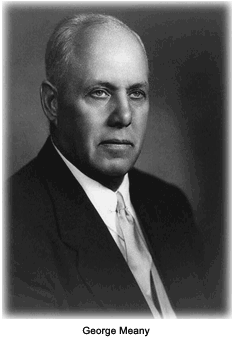George Meany was one of the guiding lights of the American labor movement in the middle of the 20th century. A plumber by trade, Meany rose through his own union to eventually head the American Federation of Labor and was instrumental in its reunification with the Congress of Industrial Organizations in 1955, after two decades of schism. Elected the first president of the AFL-CIO, he remained in that office until 1979.
 Meany was born on August 16, 1894, in New York City. His father was president of the local plumbers` union. He left high school without a diploma to enter his father`s trade. Following five years of apprenticeship, Meany received his journeyman plumber certificate in 1915. In 1922, he became the business manager of his local union. During the 1920s, Meany extended his contacts within the building trades and served as president of the New York State Federation of Labor from 1934 to 1939, after which he became secretary-treasurer of the AFL. During World War II, Meany was a member of the National War Labor Board, which managed wage controls in such national industries as automobiles, shipping, railways, airlines, telegraph lines, and mines.
Upon the death of William Green in 1952, Meany was elected president of the A.F. of L. Since the C.I.O. also changed presidents that year, the time appeared ripe for a rapprochement between the two labor organizations. A.F. of L. had grown to twice C.I.O.`s size. The C.I.O. came closer in ideology and method to its counterpart than it had in its prior existence. After the expulsion of communist-dominated labor unions, the C.I.O. had progressed away from more militant methods of achieving its goals. The C.I.O. was more interested in seeking a higher standard of living for its members than for the concerns of minority groups, consumers, or workers in non-organized urban areas. After extensive negotiations with Walter Reuther, the new president of the A.F. of L., the two organizations announced their merger in 1955. At the first national convention of the AFL-CIO in 1956, Meany was elected its first president.
Meany`s naturally conservative instincts put him in conflict with Reuther, an erstwhile socialist. The conflict came to a head in 1968, and Reuther withdrew the United Auto Workers Union from the AFL-CIO. The U.A.W. did not return until 1982.
Meany expressed solid support for the Vietnam War and, as a result, did not support ^George McGovern^, the Democratic candidate for the presidency in 1972. During Meany’s later years, the AFL-CIO supported such social programs as Medicare and helped in the creation of the Labor Studies Center, organizations for women’s rights, minorities and retirees. Meany also supported the organization of the budding United Farm Workers union.
In 1979, Meany decided not to run for re-election and turned over leadership to vice president Lane Kirkland. At the age of 85, Meany died on January 10, 1980, in Washington, D.C.
Meany`s staunch belief in higher standards of living for all workers was summed up when he said,
Meany was born on August 16, 1894, in New York City. His father was president of the local plumbers` union. He left high school without a diploma to enter his father`s trade. Following five years of apprenticeship, Meany received his journeyman plumber certificate in 1915. In 1922, he became the business manager of his local union. During the 1920s, Meany extended his contacts within the building trades and served as president of the New York State Federation of Labor from 1934 to 1939, after which he became secretary-treasurer of the AFL. During World War II, Meany was a member of the National War Labor Board, which managed wage controls in such national industries as automobiles, shipping, railways, airlines, telegraph lines, and mines.
Upon the death of William Green in 1952, Meany was elected president of the A.F. of L. Since the C.I.O. also changed presidents that year, the time appeared ripe for a rapprochement between the two labor organizations. A.F. of L. had grown to twice C.I.O.`s size. The C.I.O. came closer in ideology and method to its counterpart than it had in its prior existence. After the expulsion of communist-dominated labor unions, the C.I.O. had progressed away from more militant methods of achieving its goals. The C.I.O. was more interested in seeking a higher standard of living for its members than for the concerns of minority groups, consumers, or workers in non-organized urban areas. After extensive negotiations with Walter Reuther, the new president of the A.F. of L., the two organizations announced their merger in 1955. At the first national convention of the AFL-CIO in 1956, Meany was elected its first president.
Meany`s naturally conservative instincts put him in conflict with Reuther, an erstwhile socialist. The conflict came to a head in 1968, and Reuther withdrew the United Auto Workers Union from the AFL-CIO. The U.A.W. did not return until 1982.
Meany expressed solid support for the Vietnam War and, as a result, did not support ^George McGovern^, the Democratic candidate for the presidency in 1972. During Meany’s later years, the AFL-CIO supported such social programs as Medicare and helped in the creation of the Labor Studies Center, organizations for women’s rights, minorities and retirees. Meany also supported the organization of the budding United Farm Workers union.
In 1979, Meany decided not to run for re-election and turned over leadership to vice president Lane Kirkland. At the age of 85, Meany died on January 10, 1980, in Washington, D.C.
Meany`s staunch belief in higher standards of living for all workers was summed up when he said,
"The basic goal of labor will not change. It is — as it has always been, and I am sure always will be — to better the standards of life for all who work for wages and to seek decency and justice and dignity for all Americans."